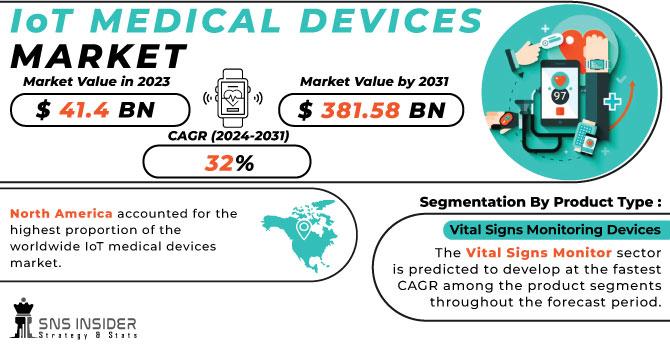IoT Medical Devices Market Size Valued at USD 41.4 Billion in 2023, Projected to Reach USD 381.58 Billion by 2031, Growing at a CAGR of 32%
IoT medical devices refer to interconnected medical devices that leverage Internet of Things technology to collect, analyze, and transmit health data. These devices play a crucial role in remote patient monitoring, chronic disease management, and enhanced healthcare delivery. The substantial growth in this market can be attributed to several key factors driving demand and innovation in the healthcare sector.
Key Drivers of Market Growth
1. Rising Adoption of Telehealth and Remote Monitoring: The increasing adoption of telehealth and remote patient monitoring solutions is a significant driver of the IoT medical devices market. These devices enable continuous monitoring of patients’ health conditions, reducing the need for frequent hospital visits and providing timely medical interventions.
2. Technological Advancements in IoT: Advancements in IoT technology, including improved connectivity, enhanced data analytics, and the proliferation of smart devices, are fueling the growth of the IoT medical devices market. These innovations enable seamless integration and efficient data exchange, enhancing patient care and operational efficiency.
3. Increasing Prevalence of Chronic Diseases: The rising prevalence of chronic diseases such as diabetes, cardiovascular disorders, and respiratory conditions necessitates continuous monitoring and management. IoT medical devices provide real-time health data, enabling early detection of complications and personalized treatment plans, thereby improving patient outcomes.
4. Growing Focus on Preventive Healthcare: There is a growing emphasis on preventive healthcare to reduce the burden of chronic diseases and healthcare costs. IoT medical devices facilitate proactive health management by providing insights into patients’ health status and encouraging healthier lifestyles.
5. Supportive Government Initiatives and Policies: Governments and regulatory bodies worldwide are implementing initiatives and policies to promote the adoption of IoT medical devices. These measures aim to improve healthcare infrastructure, enhance patient safety, and drive innovation in the healthcare sector.
Get a Free Sample Report: https://www.snsinsider.com/sample-request/1773
Market Segmentation
The IoT Medical Devices Market is segmented based on device type, connectivity technology, application, end-user, and region.
1. By Device Type:
- Wearable Devices
- Implantable Devices
- Stationary Devices
- Other IoT Medical Devices
2. By Connectivity Technology:
- Bluetooth
- Wi-Fi
- Zigbee
- Cellular
- Other Connectivity Technologies
3. By Application:
- Remote Patient Monitoring
- Chronic Disease Management
- Fitness and Wellness
- Other Applications
4. By End-User:
- Hospitals and Clinics
- Home Healthcare
- Long-term Care Centers
- Other End-Users
5. By Region:
- North America
- Europe
- Asia-Pacific
- Latin America
- Middle East & Africa
Regional Analysis
North America: North America holds the largest share of the IoT medical devices market, driven by advanced healthcare infrastructure, high adoption of innovative technologies, and significant investments in healthcare R&D.
Europe: Europe is a significant market for IoT medical devices, with countries like Germany, the UK, and France leading in the adoption of these technologies for various healthcare applications.
Asia-Pacific: The Asia-Pacific region is expected to witness the highest growth rate during the forecast period. Factors such as increasing healthcare expenditure, rising prevalence of chronic diseases, and growing awareness about advanced healthcare solutions contribute to this growth.
Latin America and the Middle East & Africa: These regions are also anticipated to experience substantial growth, supported by improving healthcare facilities, increasing demand for remote patient monitoring, and the expansion of healthcare infrastructure.
Key Market Players
Several key players are driving innovation and competition in the IoT Medical Devices Market. Some of the prominent companies in the market include:
- Medtronic PLC
- GE Healthcare
- Philips Healthcare
- Siemens Healthineers
- Abbott Laboratories
- Boston Scientific Corporation
- Johnson & Johnson
- Dexcom, Inc.
- Honeywell Life Sciences
- Omron Healthcare
These companies are investing heavily in research and development to introduce advanced IoT medical devices and expand their market presence globally.
Future Outlook
The future of the IoT Medical Devices Market looks exceptionally promising, with continuous advancements in IoT technology and increasing demand for connected healthcare solutions. The market is expected to witness significant growth, driven by the need for improved patient monitoring, personalized healthcare, and efficient healthcare delivery systems.
As the healthcare industry continues to evolve, IoT medical devices will play a pivotal role in shaping the future of patient care. The ability to seamlessly connect medical devices, capture real-time health data, and provide actionable insights will revolutionize healthcare delivery and contribute to better patient outcomes.
Other Reports You May Like:
Medical Device Connectivity Market Size
Laboratory Information Management System (LIMS) Market Size
